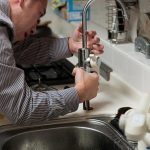Becoming environmentally friendly is more than just a passing craze, it is an important commitment to doing what is right for the planet now and for our future. There are many ways that you can live an energy efficient and environmentally friendly life, and one of the best ways to start is by improving the efficiency of your own home. Everyone should be doing their part to reduce their energy and resource consumption. It will help reduce your monthly costs and bills and it is good for the planet as a whole. Here are just a few of the ways that you can make your home more efficient and environmentally friendly.
Home Heating and Cooling
Heating and cooling costs are often the largest part of a home’s energy usage. Modern homes are almost always built with energy efficiency in mind, but there are ways you can renovate an old home to make it more efficient as well. Using building materials with a good insulation rating is key to keeping that valuable cool or warm air inside your home. Older homes can refit their home with additional insulation or new windows that are double or triple paned for added efficiency. Homeowners that are designing their own home have a lot more freedom to choose materials based on their energy efficiency throughout the design process.
One of the easiest ways to reduce heating or cooling costs is to upgrade your heater or air conditioner with a more energy efficient model. This is an investment that will pay for itself over time with lower bills from month to month. Finally, don’t forget that your own actions play an important role in how much energy you use. Lowering the thermostat even a degree in the winter or raising it in the summer can make a big difference in your energy bills. It may take a few days to get used to, however before long you won’t even realise the temperature difference, but your wallet will.
Opt for Renewable Energy
Renewable energy is definitely the future of energy production, but that doesn’t mean you should wait to get it. You may be able to install a small wind or solar energy system in your home to help meet some or even all of your energy needs. It might even be possible to get the cost of the system subsidised with a Government grant or rebate. And if you are unable to install a system then it is definitely worth switching your energy bill over to the green energy option – most energy companies offer this now.
Choose Fixtures that Consume Less Energy
When you go to buy a new appliance or fixture for your home, don’t just look at the sticker price of the item. An item that may be cheap upfront (like an incandescent light bulb) may wind up costing far more in energy usage in the long run. Fluorescent or LED bulbs may have a much higher upfront cost, but they use only a fraction of the energy to produce the same amount of light, and they last for a much longer time. Such a simple switch as changing out your light bulbs can help save a significant amount of energy, and reduce the number of bulbs you throw out over the next few years.
It makes even more sense to shop around and look at the energy efficiency when you are purchasing a large appliance. Avoid choosing appliances that are bigger than your needs, such as a freezer you will not fill or a washer that is bigger than the amount of laundry you will put in it. Look at their energy ratings and read reviews to see how much energy they take to operate. Whenever possible, buy the appliance that will use less energy while still meeting your needs.
Water Consumption
Though it is easy to forget this fact in Australia, clean water is actually a scarce and in demand resource, despite being the most plentiful substance on the planet. Reducing the amount of water you use is becoming an increasingly important priority. Installing low flow shower heads, faucets and toilets will reduce your consumption without having a noticeable effect on your daily routine. A truly environmentally friendly home-owner can even consider installing a rainwater collection system with the help of a landscaping Sydney company to use for watering their garden, flushing their toilets, or doing their laundry.
Having an energy efficient home is half about choosing the right fixtures and design choices and half about making the right personal choices to minimise your own consumption. Taking these considerations into account during your home design or renovations will help you live a more eco-friendly life.






